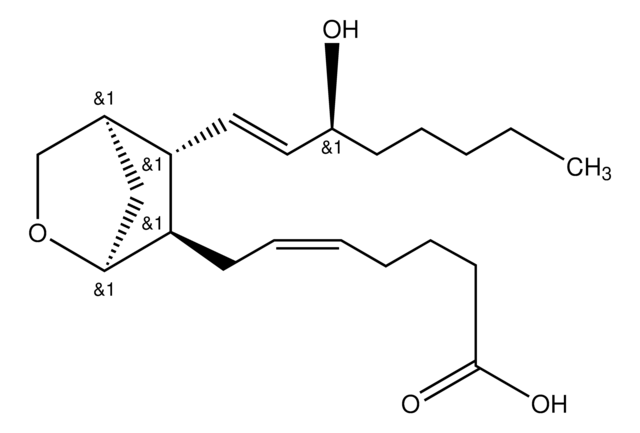AB5186
Anti-Potassium Channel Kv2.1 Antibody
Chemicon®, from rabbit
About This Item
Productos recomendados
origen biológico
rabbit
Nivel de calidad
forma del anticuerpo
purified immunoglobulin
tipo de anticuerpo
primary antibodies
clon
polyclonal
reactividad de especies
rat
fabricante / nombre comercial
Chemicon®
técnicas
immunohistochemistry: suitable
western blot: suitable
Nº de acceso NCBI
Nº de acceso UniProt
Condiciones de envío
wet ice
modificación del objetivo postraduccional
unmodified
Información sobre el gen
human ... KCNB1(3745)
Especificidad
SPECIES REACTIVITIES: Should work in mouse (100% epitope homology) and in human and rabbit (88% epitope homology). Other species have not been tested.
Inmunógeno
Aplicación
Neuroscience
Ion Channels & Transporters
Immunohistochemistry using rat brain sections.
Dilutions should be made using a carrier protein such as BSA (1-3%)
Optimal working dilutions must be determined by the end user.
Forma física
Almacenamiento y estabilidad
Nota de análisis
CONTROL ANTIGEN: Included free of charge with the antibody is 20 μg of control antigen (lyophilized powder in phosphate buffered saline, pH 7.4, containing 5% sucrose and 0.025% sodium azide). The stock solution of the antigen can be made up using 50 μL of sterile deionized water. For negative control, preincubate 1 μg of peptide with 1 μg of antibody for one hour at room temperature. Optimal concentrations must be determined by the end user.
Otras notas
Información legal
Cláusula de descargo de responsabilidad
Not finding the right product?
Try our Herramienta de selección de productos.
Código de clase de almacenamiento
11 - Combustible Solids
Clase de riesgo para el agua (WGK)
WGK 3
Certificados de análisis (COA)
Busque Certificados de análisis (COA) introduciendo el número de lote del producto. Los números de lote se encuentran en la etiqueta del producto después de las palabras «Lot» o «Batch»
¿Ya tiene este producto?
Encuentre la documentación para los productos que ha comprado recientemente en la Biblioteca de documentos.
Nuestro equipo de científicos tiene experiencia en todas las áreas de investigación: Ciencias de la vida, Ciencia de los materiales, Síntesis química, Cromatografía, Analítica y muchas otras.
Póngase en contacto con el Servicio técnico







